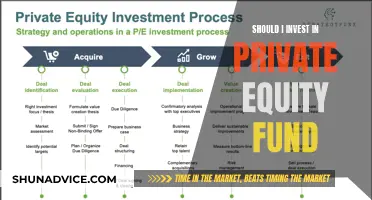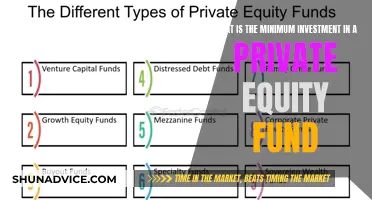
Mutual funds are a popular investment choice, particularly for those who want a hands-off approach to investing in a variety of assets. They are a type of investment vehicle that pools money from multiple investors to invest in securities such as stocks, bonds, and other assets. The main reasons for investing in mutual funds include diversification, convenience, and lower costs compared to other investment options. However, there are also disadvantages to investing in mutual funds, such as high fees, tax inefficiency, and potential management abuses. When considering investing in mutual funds, it is important to weigh the advantages against the disadvantages to determine if it is the right choice for your investment goals and risk tolerance.
| Characteristics | Values |
|---|---|
| High fees | Expense ratios and sales charges |
| Tax inefficiency | Capital gains payouts |
| Poor trade execution | Not suitable for short investment horizons |
| Management abuses | Churning, turnover, window dressing |
| Lack of control | Money managers make decisions |
| Lack of diversification | Overconcentration |

High fees
- Expense Ratios: Mutual funds charge an "expense ratio" that covers the cost of managing the fund. This ratio varies across funds and is influenced by factors such as the fund's investment strategy, trading costs, administrative expenses, and the type of fund (e.g., actively managed vs. passively managed). Actively managed funds, which aim to beat average stock market returns, tend to have higher expense ratios than passively managed funds like index funds. International and small-cap funds also tend to have higher expense ratios due to higher operational costs.
- Shareholder Fees: In addition to annual fund operating expenses, mutual funds may also charge shareholder fees, which are one-time costs incurred when buying or selling fund shares. These include sales loads (commissions paid to brokers), redemption fees (for selling shares shortly after purchase), exchange fees (for transferring shares to another fund), account fees, and purchase fees.
- Impact on Returns: High fees can significantly impact investment returns over time. Even small differences in fees between funds can add up and reduce the overall returns for investors. Therefore, it is crucial to consider the fee structure of a mutual fund before investing.
- Comparing Fees: When evaluating mutual fund fees, it is important to compare the expense ratios and shareholder fees of different funds. Most major fund managers offer no-load (commission-free) funds, but it is essential to consider the overall expense ratio and any other costs that may reduce returns over time.
- Alternative Options: If high fees are a concern, investors may consider alternative investment options such as exchange-traded funds (ETFs). ETFs are typically traded like stocks and often have lower costs associated with them, providing a more cost-effective investment option.
- Fee Sensitivity: Some types of funds are more sensitive to high fees than others. For example, fixed-income funds, particularly high-yield bond funds, tend to have higher expense ratios. On the other hand, domestic bond funds investing in high-quality government and corporate securities usually have lower expense ratios among fixed-income categories.
Index Funds: When to Invest for Maximum Returns
You may want to see also

Tax inefficiency
Mutual funds are a popular investment choice, offering benefits such as advanced portfolio management, dividend reinvestment, risk reduction, convenience, and fair pricing. However, one of the disadvantages of investing in mutual funds is their potential tax inefficiency. This tax inefficiency can lead to a significant tax burden for investors.
When mutual fund managers sell securities to accommodate shareholder redemptions or reallocate assets, it creates capital gains for shareholders, even if they have an unrealized loss on their overall investment. This results in higher taxes for investors in the form of distributions. The turnover ratio for the largest mutual funds is almost 75%, meaning investors are responsible for the entire year's taxable gains, regardless of when they purchased the fund. This can lead to unexpected tax bills, especially for those in the top tax bracket.
Additionally, mutual fund managers are required to distribute 95% of their capital gains to shareholders, and they may attempt to clean out any gains at the end of each year to minimize the buildup of large capital gains. This can further increase the tax burden on investors.
To optimize for tax efficiency, investors can consider choosing mutual funds with low turnover ratios, investing in funds that include non-dividend-bearing stocks, zero-coupon bonds, and municipal bonds. ETFs (exchange-traded funds) are also generally more tax-efficient than traditional mutual funds, as they have fewer "taxable events" and taxes are minimized for the holder.
It's important for investors to carefully consider the potential tax implications of investing in mutual funds and seek advice from a financial advisor to make informed decisions.
Investment Trust vs Fund: What's the Difference?
You may want to see also

Poor trade execution
For investors seeking faster execution times, perhaps due to short investment horizons, day trading, or timing the market, mutual funds may not be the best option. This is because the NAV is calculated only once per day, and the trade is executed at the next available NAV after the order is placed. This means that if an investor places an order to buy or sell shares of a mutual fund before the cut-off time for same-day NAV, they will receive the same closing price NAV for their trade.
Additionally, mutual fund trades may be subject to various fees and charges, such as sales loads, transaction fees, and account fees. These fees can impact the overall return on investment and are important to consider when evaluating the costs and benefits of investing in mutual funds.
Mutual Fund Investment: Key Factors to Consider
You may want to see also

Management abuses
Examples of Management Abuses
- Churning, turnover, and window dressing: Unnecessary trading, excessive replacement, and selling the losers prior to quarter-end to fix the books.
- Late trading: Investors place trades after the mutual fund has calculated the price of its shares, usually at the 4:00 p.m. Eastern Time close of financial markets, but receive that day's fund share price.
- Market timing: Frequent buying and selling of mutual fund shares by sophisticated investors, such as hedge funds, to profit from short-term pricing discrepancies.
Smart 401k Investing: Choosing the Right Funds for You
You may want to see also

Not FDIC-insured
Mutual funds are not insured by the Federal Deposit Insurance Corporation (FDIC). This is because mutual funds are not bank deposits and are therefore not insured by the FDIC.
The FDIC is an independent agency of the United States government that protects customers of insured banks in the event of their bank failing. FDIC insurance covers all types of deposits received by a bank from the general public, such as savings accounts, demand deposits, and time deposits.
Mutual funds are not considered deposits and are therefore not insured by the FDIC. Mutual funds are investment vehicles that pool money from multiple investors to purchase stocks, bonds, commodities, and other securities. They are managed by professional fund managers who make investment decisions on behalf of the investors in the fund.
While mutual funds offer a range of benefits, such as diversification, professional management, and convenience, they are not without risk. The value of mutual funds can decrease due to market conditions or the performance of a specific security.
It is important for investors to understand the risks associated with mutual funds and conduct thorough research before investing.
Best Funds to Invest in Right Now
You may want to see also
Frequently asked questions
High risk. Mutual funds are considered a safer investment option due to the diversification of investing in multiple securities.
Tax efficiency. Mutual funds are known for their tax inefficiencies, which can lead to unexpected costs for investors.
Higher returns. Mutual funds generally offer lower returns compared to individual stock investments, but provide stability and lower risk.
Higher returns. Mutual fund shares can be easily redeemed, and most funds have low minimum investment requirements, making them accessible to a wide range of investors.
High fees. While mutual funds do charge various fees, they are often considered affordable and offer a cost-effective way to invest in a diversified portfolio.







